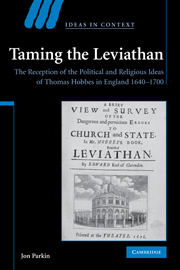 Taming the Leviathan
Taming the Leviathan Book contents
- Frontmatter
- Contents
- Acknowledgements
- Introduction
- 1 Reading Hobbes before Leviathan (1640–1651)
- 2 Leviathan (1651–1654)
- 3 The storm (1654–1658)
- 4 Restoration (1658–1666)
- 5 Hobbes and Hobbism (1666–1675)
- 6 Hobbes and the Restoration crisis (1675–1685)
- 7 Hobbism in the Glorious Revolution (1685–1700)
- Conclusion
- Bibliography
- Index
- Ideas in Context
6 - Hobbes and the Restoration crisis (1675–1685)
Published online by Cambridge University Press: 05 May 2010
- Frontmatter
- Contents
- Acknowledgements
- Introduction
- 1 Reading Hobbes before Leviathan (1640–1651)
- 2 Leviathan (1651–1654)
- 3 The storm (1654–1658)
- 4 Restoration (1658–1666)
- 5 Hobbes and Hobbism (1666–1675)
- 6 Hobbes and the Restoration crisis (1675–1685)
- 7 Hobbism in the Glorious Revolution (1685–1700)
- Conclusion
- Bibliography
- Index
- Ideas in Context
Summary
Hobbes's work had been associated with many features of political and cultural life in the early 1670s; atheism, libertinism, authoritarian churchmen and seditious dissenters. But as the crown appeared to drift towards what critics like Marvell would characterise as popery and arbitrary government, Charles's policies began to look more like the Hobbism condemned by Harrington and Lawson. Although Hobbes's absolutism had always been condemned, this feature of Hobbes's argument had drawn less attention in the early Restoration period. Partly this was because Hobbes had been successfully recast by Royalist propaganda as a seditious contract theorist, but a connected reason was that most parties had good reasons to magnify royal authority in a manner sometimes not unlike that described in Leviathan. Parliamentarians, Anglican churchmen and dissenters, for example, all sought royal support for their causes; if Eachard found nothing exceptional in chapters 18–20 of Leviathan, Marvell, as we have seen, could also appeal to Charles's absolute authority in a Hobbesian fashion as a possible means of bringing about a more moderate approach to dissent. As the decade wore on, however, the king's absolute authority started to seem less benign. The increasing (and to a large extent justified) suspicion that the court favoured popery and absolutist France began to motivate political opposition. The court's attachment to foreign arbitrary absolutism took centre-stage as a danger to law, property and religion. In this context, Leviathan's earlier reputation as the textbook of despotic absolutism could be fitted into more general anxieties about the court.
- Type
- Chapter
- Information
- Taming the LeviathanThe Reception of the Political and Religious Ideas of Thomas Hobbes in England 1640–1700, pp. 312 - 377Publisher: Cambridge University PressPrint publication year: 2007


